A la Recherche
The Thirties. By Julian Symons. (Cresset Press, , 25s.) , 25s.) ,
I he Fearful Fifties. By Low. (Bodley Head, 20s.) AND to be young was very . . . interesting, any- Way, , and we are lucky to get this splendid evocation by an erudite denizen of the Thiraes, 448 since naturalised in the present indeed, yet retaining his affection for the old country and even practising some of its fine old peasant vir- tues like keeping a social eye on literature. Mr. SYmons's method is quotation connected by com- ruentary, on the lines of Aldous Huxley's Texts asid Pretexts. It is inadequate to call this finely written and engrossing book unique, for I feel that even when others of the sort are published, it may well remain the best, giving, above all, the authentic flavour of a period more remote, as 1,)unald Davie has told us, than Ithaca or Rome. Air. Symons and his texts are continuously ilk- nlinating—on Mosleyites and hunger marchers. Surrealism and the Left Book Club, New Verse d Left Review. Auden writes, 'the best reason
have for opposing Fascism is that at school
lived in a Fascist state.' There is the Oxford 011ective Poem; the controversy about Edith ,4well's alleged plagiarisms; the vigour of Waiting for Lefty; the feeling that of the writers _114 fitting into the Thirties' social-activist line kiraves, Orwell and Wyndham Lewis were rele- v. ant, while Eliot was not. And, above all, there 's Spain—the generous impulse of anti-Fascism od the befouling of it by Stalinism. Mr. Symons, remaining generously true to the ;1'4-Stalinist Leftism of the period, is in a posi- ',Ion to claim more strength, decency and sense 'or it than he can see in the rechaufie Left of catIr own time. Veterans like himself, he says, must be astonished by the targets in the sights of young Left-wing artists nowadays. To draw a bead on the Establishment, on the Royal Family, on the antics of gossip column writers —are they really worth powder and shot? The Forties, in between, were so very dif- Ierent: war against Hitlerism, then defence against Stalinism; a coalition, then a Labour Government; a collapsed poetry and a decent Archbishop of Canterbury. . . . And yet if the hritish Thirties and Fifties do resemble each Other, it is in the sense of Marx's remark that his- TrY repeats itself, first as tragedy, then as farce. `19 intelligent girl said to me the other day, 'the ericans are Fascists.' Equally silly things were s,tud in the Thirties, but it would have been HTPossible to say just that—because there were PeutY of real Fascists. And real unemployment lad. economic crisis, too. The issues that now 11.1111)48e directly are comparatively trivial. The uorrors of the Fifties, from apartheid to the threat of nuclear war, lack local immediacy; and 8,(mue, too, are situated in a blind spot of the efttst world-view, as taking place between the "-.,,,rze.choslovak border and the China Sea. The urries as Mr. Symons shows, had their own stY'e of self-righteousness. It was thought that P.sYchology proved all adherents of non-Left .1t,ews to be half dead with ill-suppressed guilt. jic self-righteousness of the Fifties' Left seems wore unpleasant, just because it is less self- confident, and staler. 0 Such attitudes are the death of democracy. No ,,r* would say that the people is infallible. Yet it errors seem slight over these decades in com- 7!rlson with those of the political intellectuals.
nere is a lot to be said against a Conservative government. But at least Whitehall has never
echoed to a victory parade of SS or MVD thugs, past lampposts tastefully decorated with Labour MPs, Left and Right, as it could have if the Peace Pledgers (c. 1935), the Stalin-appeasers (c. 1948) or the NATO-busters (now) had prevailed. I have left out the late Thirties; then alone, on major issues, the intellectuals were right. That is the glory of Mr. Symons's period. But he has to con- clude, 'History did not fit us for long. . .
Vicky, however, went on wearing the old knee- breeches and Norfolk jacket, ignoring burst seams and popping buttons. All the attitudes of the Thirties emerge, with the irreducible mini- mum of mutatis mutandis. There is even (though Vicky is no Russodule) the old stuff about 'Social- ist Planning' in the Communist countries, puffing away efficiently while the West potters—as though the only economies to collapse in chaos in the last five years had not been the 'planned' ones of Hungary and Poland. But, as Mr. Symons shows of Left Review's, cartoons may thrive on nonsense that destroys literature. And Vicky has an inventive and amiable pencil. Low also holds his radical views firmly. But he does not always assume that everyone on the Good Guys' side is always right. This gives him an air of not being prefabricated, which is refreshing. His cartoon presenting a guard of honour of tricorned blimps gritting their teeth for inspection by Makarios after the treaty is rich and penetrating, whereas Vicky's on the same thing is merely apt.
ROBERT CONQUEST


































 Previous page
Previous page